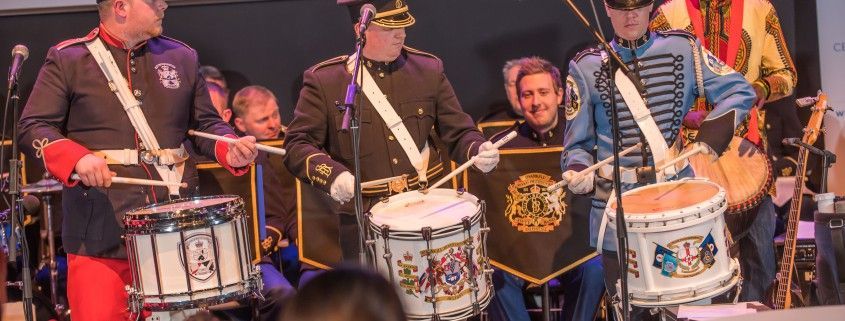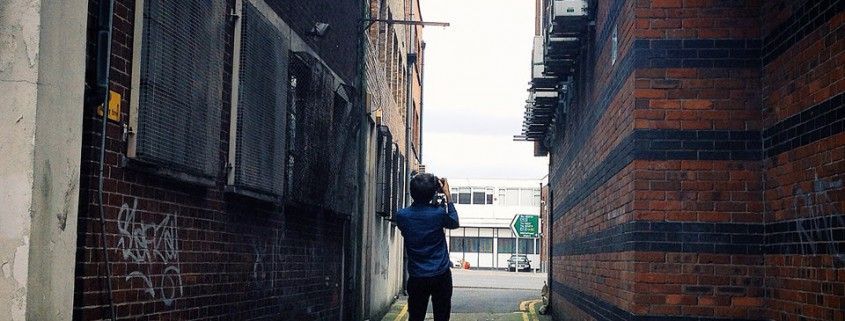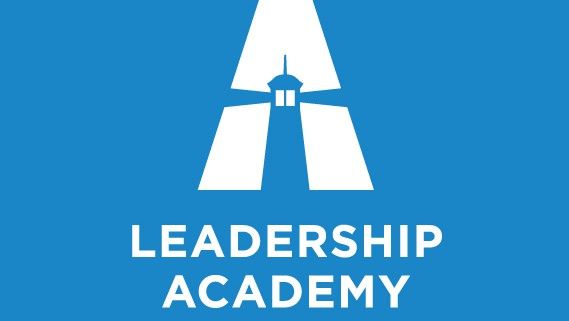Music Unite: Celebrating Culture by Jeffrey Donaldson MP
Music can unite people, cultures, traditions and communities. This was clearly demonstrated by the remarkable ‘Music Unite’ event held at The MAC Belfast last week.
Theatre goers mixed with Loyalist bands in the heart of Belfast’s vibrant Cathedral Quarter – in a space where the diversity of culture brought people and communities together.
It was an evening of music, rhythm, culture, diversity and positivity. The Shankill Road Defenders, Ballykeel Loyal Sons of Ulster and North Down Defenders performed together with an eclectic mix of traditional flute band music fused with Colombian, Kurdish, Ghanaian, Sri Lankan and Irish sounds. Flutes from Ulster, pipes from Colombia, drums from Ghana and Uilleann pipes came together to create powerful symphony.
The Music Unite event was the highlight of what has been an incredible and transformative project.
I grew up in a culture of bands, joining Orangefield Flute Band, Kilkeel when I was still in Primary School and over a number of years of hard practice graduating from percussion to the flute in what was one of the finest part-flute bands in County Down. I well remember bursting with pride as I donned my band uniform for the first time and marched all the way from Ballinran Orange Hall to Kilkeel for the annual Twelfth parade. In later years I was a founding member of the Pride of Ballinran Flute Band, today one of the best melody flute bands in the country. Therefore, I know the bands scene well and recognise the invaluable contribution that marching bands make to the lives of many young people. Those young people experience what it is like to be part of a team – to make a contribution in creating musical and human harmony and learning a sense of discipline that stands them in good stead for the challenges of a modern society.
With my interest in marching bands, I have seen at first hand the tremendous local talent that exists but is often overlooked within the music scene. Sir James Galway developed his immense musical ability in a flute band in Belfast and there may well be other James Galway’s in the ranks of such bands across Northern Ireland. Music Unite offers a platform for bands to display their undoubted talent to a wider audience with whom they may not normally connect and is designed to break down barriers and challenge perceptions and stereotypes that are often associated with the local band scene. This is not about persuading people to alter their identity or to change their culture to suit others. It is about promoting a better understanding of that culture and enabling people to engage with each other in a way that promotes greater harmony across our community.
This does not mean that we overlook the problems sometimes associated with parading and music in Northern Ireland. Far from it. I recognise that this is a controversial issue for some and that a minority on both sides of this debate sometimes engage in behaviour that is unacceptable. However, the idea that the way to resolve this or to alter negative behaviour is to isolate or punish an entire musical fraternity is one that needs to be challenged. Inclusivity must be practised and not just preached and ought not to require people to abandon their beliefs or their identity or to somehow whitewash their culture to create some kind of unrealistic neutrality. Diversity surely implies respect for difference, although that respect has to be gained and not just taken for granted.
Last year the Centre for Democracy & Peace Building in partnership with ‘Beyond Skin’ launched the ‘Music Unite’ programme. Our partners at Beyond Skin lead by the brilliant Darren Ferguson are to be commended for their pioneering work with this project.
This work began with the Shankill Road Defenders with the aim of using music to unify people and empowering and enabling individuals and communities.
Our innovative programme enabled Loyalist bands to meet, exchange ideas & music genres with people from other backgrounds and cultures, develop musical skills, build capacity and challenge stereotypes.
In the past year, the Shankill Road Defenders have performed in numerous events in places that would have been simply unimaginable just a few years ago. This included playing to hundreds of people as part of the Culture Night Belfast and a performance at Belfast City Hall as part of the British-Irish Intergovernmental Secretariat’s St Patrick’s Day reception. The band also played with the North Down Defenders at the Chinese Welfare Association in Belfast earlier this year. Cultures and communities united by music.
It’s been an incredible journey. The bands involved in this project have demonstrated remarkable vision, energy and leadership. They have engaged positively with this project – perfecting their musical skills and collaborating with musicians from around the world. They have been ambassadors for the positive contribution that loyalist bands make to our musical heritage and culture in Northern Ireland.
A report highlighting the success of Music Unite by Professor John Brewer and Dr Francis Teeney from the Senator George J. Mitchell Institute for Global Peace, Security and Justice at Queen’s University Belfast has been published by the Centre for Democracy and Peace Building. I commend the authors for endorsing the programme and note the important recommendations they have made. This will no doubt promote further debate and discussion on the way forward. We must continue this vital work and give further consideration to the recommendations contained within the report. The Report is available at https://democracyandpeace.org/wp-content/uploads/2016/01/Music-Unite-Report.pdf
Music Unite is the start of a new flow, a new rhythm that brings people together. It challenges perceptions and stereotypes. Importantly, it provides hope that Northern Ireland is moving forward together to a new beat – one which creates a positive celebration of our unique and diverse culture and identity.



